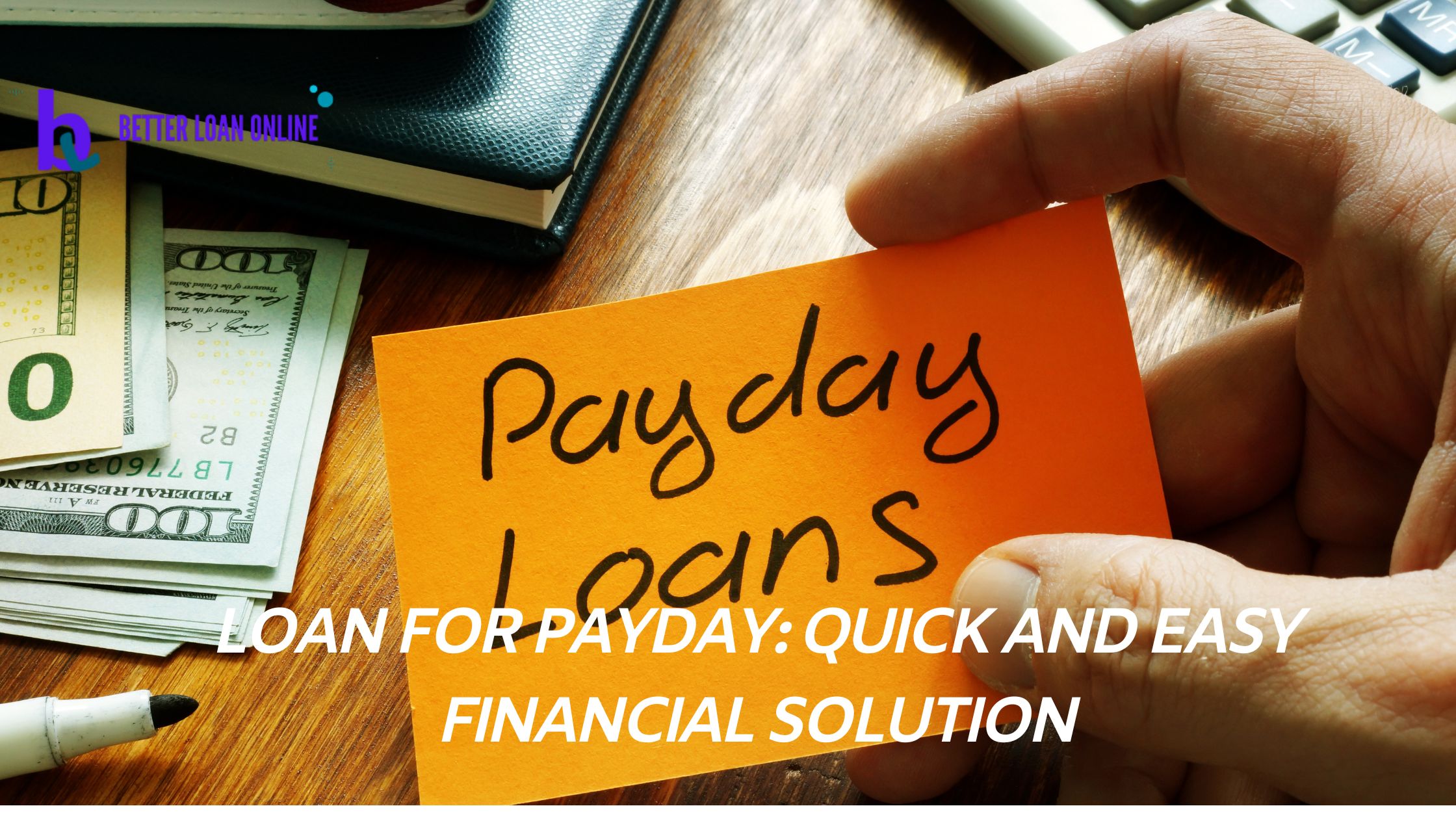
- Are you struggling to make ends meet before your next paycheck arrives? Have unexpected expenses arisen, and you need a quick financial solution?
- Payday loans might be the answer to your financial woes. In this blog, we will provide you with a comprehensive overview of payday loans.
- We will go over how they work, their requirements, and the benefits and drawbacks of taking out such loans. You will also learn about predatory lending practices and how to identify and avoid them.
- We will explore better alternatives to payday loans, such as personal loans and emergency savings.
- Lastly, we will guide you on how to break free from the payday loan cycle and make informed decisions about your finances.
- Read on to find out if loan for payday is the right solution for you.
- Understanding Payday Loans: A Quick Overview
- Payday loans provide a quick and convenient way to access cash for short-term financial needs.
- These loans are typically due on your next payday, making them a temporary solution. State laws regulate payday loans, which means loan amounts and interest rates can vary.
- Applying for a payday loan is a simple process that can be done online or in-store. Before borrowing, it’s crucial to understand the terms and fees associated with these loans.
- By familiarizing yourself with the underwriting process and applicable lender’s terms, you can make informed decisions.
- Remember, each state has its own regulations, such as the California Deferred Deposit Transaction Law or the Texas Finance Charge.
The Mechanics of a Payday Loan: How Does It Work?
To obtain a payday loan, you need to provide proof of income and a valid ID.
Credit checks are usually not performed by payday lenders. Once approved, the loan amount is typically deposited into your bank account.
Repayment is due on your next payday or within a few weeks, with additional fees and interest charges for late payment.
Loan Requirements for Payday Loans
Loan requirements for payday loans vary by state but generally include a steady source of income and a valid ID.
Some lenders might ask for a post-dated check as collateral, while others may assess your eligibility based on your income and their discretion.

Additionally, having an active checking account is usually a prerequisite for the loan proceeds to be deposited into.
It’s important to note that certain states have specific laws regarding payday loans, including loan limits and repayment terms. Understanding and meeting these requirements is essential when considering a payday loan.
The High Interest Rates: A Major Downside
Payday loans come with high interest rates, increasing the overall cost of borrowing.
The annual percentage rate (APR) for these loans can be significantly higher compared to other credit options.
Before considering a payday loan, it is crucial to carefully assess the associated interest rates and fees. These loans should only be used as a short-term financial solution, not as a long-term borrowing option.
It may be more cost-effective to explore alternatives such as personal loans or credit counseling.
By understanding the drawbacks of high interest rates, borrowers can make informed decisions about their financial choices.
The Debt Cycle: How Payday Loans Can Lead to Financial Instability

- Payday loans can create a cycle of debt if not managed properly.
- Borrowers who are unable to repay the loan by the due date may be tempted to roll over the loan, incurring additional fees.
- Relying on payday loans for ongoing financial needs can lead to a cycle of borrowing and repayment.
- It’s important to have a plan in place to repay the loan on time and avoid falling into a debt trap.
- Exploring alternative financial solutions, such as budgeting or seeking assistance from a credit counseling agency, can help break the cycle of payday loan debt.
Predatory Lending Practices: An Unseen Threat
- Some payday lenders take advantage of vulnerable borrowers through predatory lending practices, using deceptive tactics to lure them into high-cost loans.
- To avoid falling victim to these practices, it’s crucial to research and choose reputable payday lenders.
- Understanding the loan agreement’s terms and conditions and reading customer reviews can help identify predatory lenders.
- If you suspect you’ve been a victim of predatory lending, report it to your state’s Department of Financial Protection or the Consumer Financial Protection Bureau.
- Being aware of predatory lending practices is essential in safeguarding oneself from potential financial harm.
Identifying and Avoiding Predatory Lenders
Predatory lenders often target individuals with low incomes or poor credit scores.
Look for warning signs of predatory lending, such as excessive fees or pressure to borrow more than you need.
Research potential lenders and read customer reviews to ensure they have a positive reputation. Be cautious of lenders who do not clearly disclose their loan terms and fees.
If you suspect a lender is engaging in predatory practices, report them to the appropriate regulatory agency.
Remember, when dealing with loan for payday, it’s crucial to identify and avoid predatory lenders to protect yourself from potential financial harm.
The Lack of Regulation: A Cause for Concern?
The lack of consistent regulation across states when it comes to payday loans can be concerning.
Borrowers may find it difficult to understand their rights and protections due to varying laws.
Advocacy groups are pushing for federal regulation to standardize practices and protect consumers nationwide.
Familiarizing oneself with state laws is crucial for informed decision-making.
The Impact on Credit Scores: Long-Term Consequences
Payday loans typically don’t require a credit check, so they don’t directly affect your credit score.
However, if you don’t repay the loan on time, the lender may report the delinquency to credit bureaus, which can have a negative impact on your credit score.
Additionally, multiple payday loan applications in a short period can raise red flags to lenders and lower your credit score.
To maintain good credit health, it’s crucial to repay these loans promptly and avoid excessive borrowing.
If you’re concerned about your credit score, consider alternative financial solutions or seek credit counseling before resorting to payday loans.
How to Protect Your Credit Score When Using Payday Loans
When using payday loans, it’s crucial to protect your credit score.
To do so, borrow only what you need and can comfortably repay on time, ensuring it aligns with your budget.
If you’re unable to meet the repayment deadline, contact the lender to explore alternative options.
Regularly monitor your credit score for errors or inaccuracies, and consider seeking guidance from a credit counseling agency to manage your finances effectively and improve your credit health.
By following these steps, you can safeguard your credit score while utilizing payday loans as a financial solution.
Exploring Better Alternatives to Payday Loans
Personal loans provide more flexible repayment terms and lower interest rates compared to payday loans.
Instead of relying on payday loans, building an emergency savings fund can serve as a financial safety net.
Credit counseling services offer assistance in creating a budget and exploring alternative options for managing financial needs.
Online loans from reputable lenders provide the convenience of quick access to funds without the high fees associated with payday loans.
Understanding applicable state laws empowers borrowers to make informed decisions about payday loans.
By considering these alternatives, individuals can find better solutions to meet their financial needs.
The Benefits of Personal Loans as an Alternative
Personal loans provide several advantages as an alternative to payday loans.
Unlike payday loans, personal loans often offer larger loan amounts and longer repayment terms.

Additionally, the interest rates associated with personal loans are generally lower than the high APRs of payday loans.
Applying for a personal loan is a straightforward process and can often result in borrowers receiving funds within the next business day.
Furthermore, personal loans do not require collateral, making them accessible to a wider range of individuals.
This financial flexibility allows borrowers to use personal loans for various purposes, catering to their unique financial needs.
The Importance of Emergency Savings over Payday Loans
Having emergency savings is crucial for maintaining financial stability and reducing reliance on payday loans.
It provides a much-needed cushion during unforeseen circumstances, helping individuals cover unexpected expenses without resorting to high-interest loans.
By saving regularly and consistently, individuals can break free from the cycle of relying on payday loans and develop financial responsibility.
Establishing an emergency savings fund demonstrates preparedness and ensures peace of mind during challenging times.
With emergency savings in place, individuals can alleviate financial stress and confidently navigate through unexpected situations.
By prioritizing savings, they can avoid the pitfalls of payday loans and achieve long-term financial security.
How to Break Free from the Payday Loan Cycle?
Breaking free from the payday loan cycle requires proactive steps.
Start by creating a budget to identify areas for potential savings.
Seek credit counseling or financial education programs for guidance.
Explore alternative financial options like personal loans or assistance programs.
Build an emergency savings fund as a safety net.
Develop a repayment plan and negotiate with lenders to gradually eliminate payday loan debt.
Is Loan for Payday the Right Solution for You?
Assessing your financial situation, income stability, and repayment ability is crucial when considering a payday loan.
Understanding the potential risks, high-interest rates, and fees associated with these loans can help you make an informed decision.
Exploring alternative options and consulting with a financial advisor can provide personalized guidance on whether a payday loan aligns with your financial needs.
How to Make Informed Decisions about Payday Loans?
- To make informed decisions about payday loans, it is crucial to research and understand state-specific regulations.
- Comparing multiple lenders helps identify reputable options, while thoroughly reviewing loan agreements ensures awareness of terms.
- Seek clarification from lenders and consult trusted financial advisors for valuable insights.
What are the eligibility requirements for a payday loan?
- Eligibility requirements for payday loans vary based on the lender and jurisdiction.
- Typically, applicants must be at least 18 years old with a steady source of income.
- In addition, proof of identity such as a driver’s license or passport may be required.
- Some lenders may also conduct credit checks or request collateral for larger loan amounts.
How does a payday loan differ from other types of loans?
- Payday loans differ from other types of loans in several ways.
- They are typically smaller and have shorter repayment periods.
- Additionally, payday loans often come with higher interest rates and fees.
- Unlike traditional loans, payday loans do not require collateral.
- These loans are designed to provide a short-term solution for emergency expenses.
What is the typical interest rate for a payday loan?
- The typical interest rate for a payday loan can vary depending on the lender and location.
- In the United States, the average interest rate for a payday loan is approximately 400% APR.
- However, it’s important to note that interest rates may be higher for longer-term loans or larger loan amounts.
- Before borrowing, thoroughly review and understand the terms and fees associated with a payday loan.
Conclusion
In conclusion, while payday loans offer quick and convenient financial solutions, it is important to be aware of the potential downsides.
The high interest rates associated with these loans can lead to financial instability and trap borrowers in a cycle of debt.
Additionally, predatory lending practices and the lack of regulation in the industry pose risks to borrowers.
It is crucial to identify and avoid predatory lenders and explore better alternatives such as personal loans or building emergency savings.
Making informed decisions about payday loans can help you avoid negative consequences and maintain your financial well-being.





